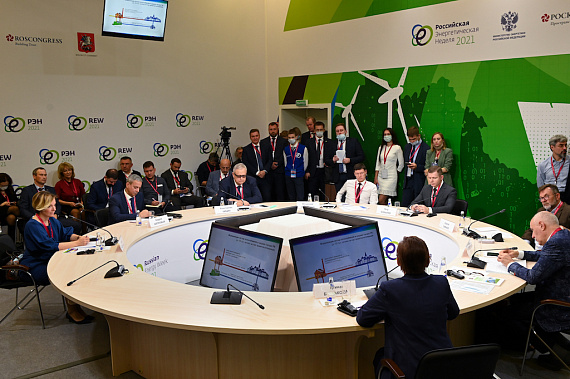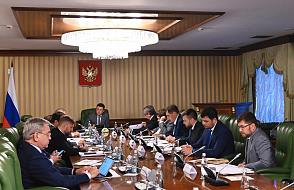The Energy Transition in the Housing and Utilities Sector and State Support for Programmes to Renew Municipal Infrastructure

CONCLUSIONS
Reducing emissions and achieving a high level of energy efficiency, including in the housing and utilities sector amidst the backdrop of tightening international legislation is a strategic objective for the Russian Federation
“We are seeing increased public interest in environmental issues, as well as tightening international legislation on the consumption of hydrocarbon resources. This is a challenging scenario, but it also presents an opportunity to improve the quality and reliability of services and increase economic efficiency. Achieving high levels of energy efficiency is therefore a strategic objective of national importance. The housing and utilities sector is no exception here. In fact, it is one of the industries that deserves the greatest scrutiny… Efforts to increase energy and environmental efficiency are being incorporated into national projects and government programmes," Alexander Lomakin, First Deputy Minister of Construction, Housing and Utilities of the Russian Federation.
High-quality modernization must be carried out across Russia’s housing and utilities system
“Something must be done in order to stem the tide of greenhouse gas emissions and absorption rates… If the housing and utilities sector isn’t transformed in the coming decades, it will become a serious obstacle to reducing the carbon intensity of the Russian economy,” Petr Bobylev, Deputy Minister of Energy of the Russian Federation.
“As for housing and utilities infrastructure, large-scale modernization is required, based on modern, energy efficient equipment that meets all safety standards,” Alexander Lomakin, First Deputy Minister of Construction, Housing and Utilities of the Russian Federation.
PROBLEMS
Decreased efficiency and reliability of housing and utilities systems, losses for companies when citizens on benefits use energy service equipment
“The key challenge for larger residential units today is so-called beneficiaries. The benefits do not cover energy providers, which must either collect the funds from tenants or suffer losses. The alternative is the benefits recipient paying more than they were paying when the energy service equipment was installed,” Irina Bulgakova, Head of the Housing and Utilities Commission of the Public Council of the Ministry of Construction, Housing and Utilities of the Russian Federation.
SOLUTIONS
Developing a set of standards for construction and modernization in the housing and utilities system, utilizing the ‘infrastructure menu’
“We must develop regional reconstruction programmes that take into account the need to increase energy efficiency and create energy efficient standards for key design solutions. The question of attracting investment from property owners and private investors should also be looked at… We now have a significant number of instruments that could be used to modernize utilities infrastructure, most notably the infrastructure budget loans that allow us to modernize municipal facilities. Another effective support mechanism which is available on a repayable basis is the National Wealth Fund. The mechanism, which is currently being fine-tuned, has so far allocated RUB 150 billion of project financing, covering up to 80% of project costs at a per annum interest rate of 3.5% over 25 years. This is a fairly promising mechanism on preferential terms, and the possibility of doubling funding for the National Wealth Fund is currently being looked at,” Alexander Lomakin, First Deputy Minister of Construction, Housing and Utilities of the Russian Federation.
Increasing the energy efficiency of existing facilities by carrying out major renovations
“As for buildings that have already been constructed, a programme to improve the energy efficiency of major renovations is being implemented. This is beneficial for citizens and the state alike, as it makes it possible to reduce spending on the most expensive utility, which is heating. Costs can be reduced by up to 30% and in some cases as much as 50%,” Alexander Lomakin, First Deputy Minister of Construction, Housing and Utilities of the Russian Federation.
“The energy transition in the housing and utilities sector means, first and foremost, reducing the energy consumption of buildings. It also means the construction of energy efficient housing and mass-scale renovations,” Irina Bulgakova, Head of the Housing and Utilities Commission of the Public Council of the Ministry of Construction, Housing and Utilities of the Russian Federation.
“Mass-scale renovations, which began in 2005–2006, have of course altered the picture. Here [during the discussion], however, I have heard people talk about energy efficient and inefficient major renovation works. Any major renovation is effective as it changes the situation,” Evgeny Gasho, Head of the Research Laboratory for Methodological Problems of Energy Saving, Moscow Power Engineering Institute.
For more information, visit the Roscongress Foundation’s Information and Analytical System at roscongress.org





